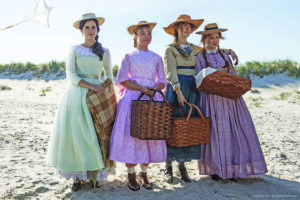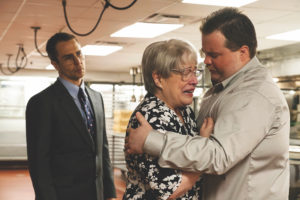There’s no question that Greta Gerwig’s adaptation (as screenwriter and director) of Louisa May Alcott’s classic novel, Little Women, is a coup. A story known for its warmth and memorable characters has been wrested from the sensibilities of 1868-69, when it was first published. With subtle changes of emphasis and tone, Gerwig gives Alcott’s March family saga a sharper, more feminist and progressive edge. She also makes other, more transformative changes to the story in order to give it a pace and feel that is, if not contemporary, then more readily accessible to contemporary audiences.

The first is in the chronology: in Gerwig’s film, the action shifts back and forth in time from the four March girls’ childhood in Massachusetts with their mother, Marmee (Laura Dern), during the Civil War, when their father is off working as a chaplain for the Union troops, to the events of their early adulthood, after the war, when they marry and make lives for themselves. The time-shifting is frequent and occasionally unclear, but it speeds the pace of 19th-century storytelling to engage the shortened attention span of 21st-century children and adults.
Second, Gerwig makes Jo (Saoirse Ronan) the effective narrator of the tale, and adds a meta-dimension: the book that budding writer Jo eventually completes is Little Women, the story we’ve just watched — and we see the process of its physical publication, even the gilded type that proclaims Jo March the author instead of Alcott. Though it’s never been a secret that Alcott created Jo as a fictional version of herself, the roman à clef aspect was never explicit in the text or in any of its many movie adaptations.
Gerwig’s film, now streaming and on disk, has garnered well-deserved critical raves, yet it must be noted that the chronology deconstruction feels a tad gimmicky. By opening with Jo as an adult and jumping back, the movie makes the girls’ childhood story seem less ingenuous and more relatable. It’s as if Gerwig couldn’t modernize the book without making it savvier — it condescends to history.
Ultimately, however, that’s not what counts. The overall effort in rethinking the work is successful. The performances are uniformly excellent, even though the characters are not equally interesting or important. Ronan as Jo is palpably impetuous and brilliant, and her growing self-awareness is fascinating to watch. Emma Watson as her older sister, Meg, makes a character conceived as conventional seem smarter and more mature. Florence Pugh, as the younger and beautiful Amy, often portrayed as a vain brat, is startlingly earnest and empathetic. When Laurie (Timothée Chalamet), the girls’ wealthy neighbor and friend, switches his affections from Jo, who thrills him, to Amy, who captivates him, it seems organic and justified, not forced and convenient. Amy loves to paint, and the last sister, Beth (Eliza Scanlen), is a musician. Beth is the sweetest and most altruistic of them all, and she becomes a believable sacrificial lamb when contracting scarlet fever and surviving, though weakened.
The film is impeccably cast. Meryl Streep as the girls’ wealthy spinster aunt is hilarious, turning a shrewish character into one who is sly, almost wise. Chris Cooper, as Laurie’s crusty grandfather, gives an emotionally distant character heartbreaking depth. Louis Garrel, as the highbrow German Friedrich Bhaer, the man who patiently wins Jo’s hand in marriage, makes a stodgy figure seem romantic, even sexy. The fluid and earthy cinematography (Yorick Le Seaux), the marvelous production design (Jess Gonchor) and costumes (Jacqueline Durran) make just the right distinctions between rich and middle-class. Gerwig, in her second directorial effort (after Lady Bird), proves herself to be a contender, a true auteur. If the film is somewhat overwritten, there are worse ways to give a sacred childhood text new life.

The exuberance of Little Women couldn’t be more of a contrast to Clint Eastwood’s staid and melancholy Richard Jewell, a true-life examination of how a man can go from celebrated hero to vilified terrorist in a matter of days. The titular subject is a security guard at Centennial Park in Atlanta during the 1996 Olympics who suspects that a deserted backpack contains a bomb. In fact, it does, and the resulting explosion, which results in two deaths and scores of injuries, is a lot less lethal as a result. He is instantly touted as a hero.
When F.B.I. investigators look into Jewell (Paul Walter Hauser), they find that he fits the persona for a lone assassin to a T: unattached, obsessed with police authority, he’s a loser living with his mother (Kathy Bates). Without other leads, they assume he planted the bomb in order to play the hero. An agent who was at the scene (Jon Hamm) leaks this to a reporter (Olivia Wilde) who comes on to him. A media typhoon descends on Jewell and his mom, turning his moment of glory into an interminable hell. With the help of an iconoclastic lawyer, Watson Bryant (Sam Rockwell), Jewell is finally able to exonerate himself. But the process strips him of all dignity and essentially ruins his life, however pathetic it was to begin with.
Though it received mixed reviews, the film, now streaming and on disk, was vilified for portraying Wilde’s reporter as an amoral hussy who unhesitatingly trades sex for a scoop. The criticism is deserved, and the depiction makes no sense. Though the F.B.I. agent is a composite character, the reporter, Kathy Scruggs, is a real person (now dead) who by all accounts would never do that. There is no need to demonize the reporter, particularly in such a lazy, sexist way, and it’s mystifying, because the rest of the film is complex, restrained, and well directed.
The 89-year-old Eastwood has made other thoughtful movies about the nature of heroism and the public’s pathology about it, from Flags of Our Fathers to, most recently, Sully and American Sniper. And because of his own public persona, as an actor who plays tough guys and dabbles in libertarian politics, false presumptions are made about his work as a filmmaker and as an artist.
Which is a shame, because although Eastwood’s filmography is highly erratic, filled with bad films and great ones, the body of work is undeniably impressive. And Richard Jewell, despite the misstep of Scruggs’s portrayal, is a deeply insightful look into how the legal system and the press, representing the citizens of a democracy, can fail.
The performances, especially Hauser’s and Rockwell’s, are profoundly good (Bates cries a lot, and was Oscar-nominated), and the characterizations are a therapist’s mother lode. What the movie celebrates is individual will, and what it chastises is a rush to judgment — classic themes for a modern era.
